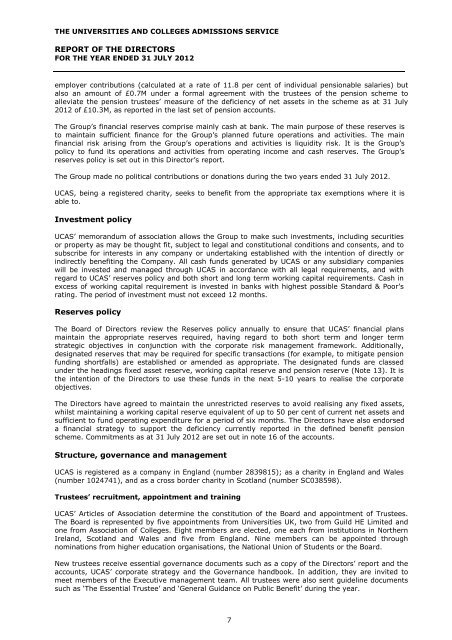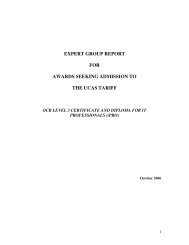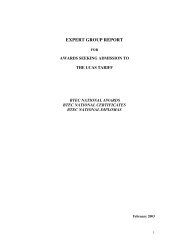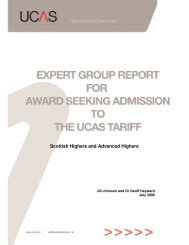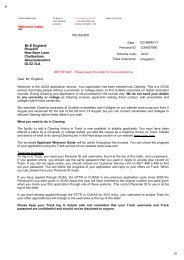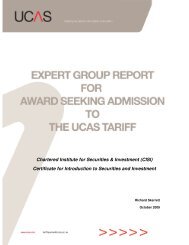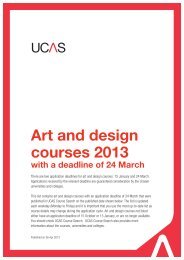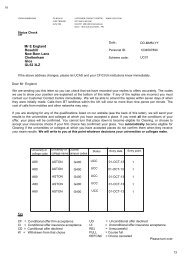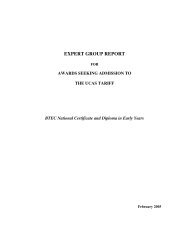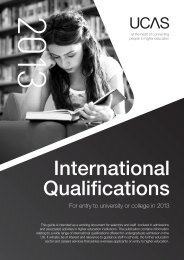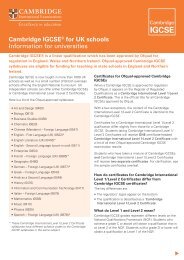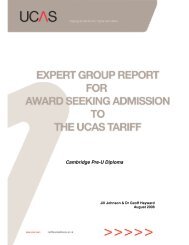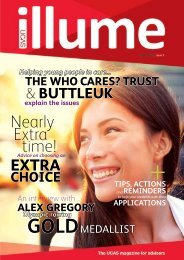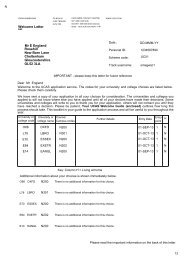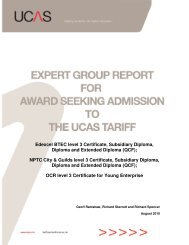Report & Consolidated Accounts for the year ended 31 July ... - UCAS
Report & Consolidated Accounts for the year ended 31 July ... - UCAS
Report & Consolidated Accounts for the year ended 31 July ... - UCAS
You also want an ePaper? Increase the reach of your titles
YUMPU automatically turns print PDFs into web optimized ePapers that Google loves.
THE UNIVERSITIES AND COLLEGES ADMISSIONS SERVICE<br />
REPORT OF THE DIRECTORS<br />
FOR THE YEAR ENDED <strong>31</strong> JULY 2012<br />
employer contributions (calculated at a rate of 11.8 per cent of individual pensionable salaries) but<br />
also an amount of £0.7M under a <strong>for</strong>mal agreement with <strong>the</strong> trustees of <strong>the</strong> pension scheme to<br />
alleviate <strong>the</strong> pension trustees’ measure of <strong>the</strong> deficiency of net assets in <strong>the</strong> scheme as at <strong>31</strong> <strong>July</strong><br />
2012 of £10.3M, as reported in <strong>the</strong> last set of pension accounts.<br />
The Group’s financial reserves comprise mainly cash at bank. The main purpose of <strong>the</strong>se reserves is<br />
to maintain sufficient finance <strong>for</strong> <strong>the</strong> Group’s planned future operations and activities. The main<br />
financial risk arising from <strong>the</strong> Group’s operations and activities is liquidity risk. It is <strong>the</strong> Group’s<br />
policy to fund its operations and activities from operating income and cash reserves. The Group’s<br />
reserves policy is set out in this Director’s report.<br />
The Group made no political contributions or donations during <strong>the</strong> two <strong>year</strong>s <strong>ended</strong> <strong>31</strong> <strong>July</strong> 2012.<br />
<strong>UCAS</strong>, being a registered charity, seeks to benefit from <strong>the</strong> appropriate tax exemptions where it is<br />
able to.<br />
Investment policy<br />
<strong>UCAS</strong>’ memorandum of association allows <strong>the</strong> Group to make such investments, including securities<br />
or property as may be thought fit, subject to legal and constitutional conditions and consents, and to<br />
subscribe <strong>for</strong> interests in any company or undertaking established with <strong>the</strong> intention of directly or<br />
indirectly benefiting <strong>the</strong> Company. All cash funds generated by <strong>UCAS</strong> or any subsidiary companies<br />
will be invested and managed through <strong>UCAS</strong> in accordance with all legal requirements, and with<br />
regard to <strong>UCAS</strong>’ reserves policy and both short and long term working capital requirements. Cash in<br />
excess of working capital requirement is invested in banks with highest possible Standard & Poor’s<br />
rating. The period of investment must not exceed 12 months.<br />
Reserves policy<br />
The Board of Directors review <strong>the</strong> Reserves policy annually to ensure that <strong>UCAS</strong>’ financial plans<br />
maintain <strong>the</strong> appropriate reserves required, having regard to both short term and longer term<br />
strategic objectives in conjunction with <strong>the</strong> corporate risk management framework. Additionally,<br />
designated reserves that may be required <strong>for</strong> specific transactions (<strong>for</strong> example, to mitigate pension<br />
funding shortfalls) are established or am<strong>ended</strong> as appropriate. The designated funds are classed<br />
under <strong>the</strong> headings fixed asset reserve, working capital reserve and pension reserve (Note 13). It is<br />
<strong>the</strong> intention of <strong>the</strong> Directors to use <strong>the</strong>se funds in <strong>the</strong> next 5-10 <strong>year</strong>s to realise <strong>the</strong> corporate<br />
objectives.<br />
The Directors have agreed to maintain <strong>the</strong> unrestricted reserves to avoid realising any fixed assets,<br />
whilst maintaining a working capital reserve equivalent of up to 50 per cent of current net assets and<br />
sufficient to fund operating expenditure <strong>for</strong> a period of six months. The Directors have also endorsed<br />
a financial strategy to support <strong>the</strong> deficiency currently reported in <strong>the</strong> defined benefit pension<br />
scheme. Commitments as at <strong>31</strong> <strong>July</strong> 2012 are set out in note 16 of <strong>the</strong> accounts.<br />
Structure, governance and management<br />
<strong>UCAS</strong> is registered as a company in England (number 2839815); as a charity in England and Wales<br />
(number 1024741), and as a cross border charity in Scotland (number SC038598).<br />
Trustees’ recruitment, appointment and training<br />
<strong>UCAS</strong>’ Articles of Association determine <strong>the</strong> constitution of <strong>the</strong> Board and appointment of Trustees.<br />
The Board is represented by five appointments from Universities UK, two from Guild HE Limited and<br />
one from Association of Colleges. Eight members are elected, one each from institutions in Nor<strong>the</strong>rn<br />
Ireland, Scotland and Wales and five from England. Nine members can be appointed through<br />
nominations from higher education organisations, <strong>the</strong> National Union of Students or <strong>the</strong> Board.<br />
New trustees receive essential governance documents such as a copy of <strong>the</strong> Directors’ report and <strong>the</strong><br />
accounts, <strong>UCAS</strong>’ corporate strategy and <strong>the</strong> Governance handbook. In addition, <strong>the</strong>y are invited to<br />
meet members of <strong>the</strong> Executive management team. All trustees were also sent guideline documents<br />
such as ‘The Essential Trustee’ and ‘General Guidance on Public Benefit’ during <strong>the</strong> <strong>year</strong>.<br />
7


